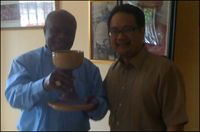Haiti’s poverty and problems run far deeper than the damage done by the recent earthquake, said General Assembly Moderator Bruce Reyes-Chow after his recent visit to the island nation.
“What I knew intellectually, but saw now with my own eyes, was that Haiti’s poverty and problems were not just because of the earthquake,” he said. “Much has to do with global policies toward Haiti, and the decades of how we have not treated Haiti well.”
Reyes-Chow cited as an example how the United States has pushed Haiti to change its tariffs on rice. As a result, the country now grows very little rice and relies on imports from outside the country.
Though he already knew that economic reality, seeing the adverse results with his own eyes made its impact stronger, Reyes-Chow said.
“I had very little expectation, going into the trip,” he told Presbyterian News Service. “And I’d guess I know about as much about Haiti as any run of the mill Presbyterian who stays on top of current events.”
Beyond the obvious challenge posed by the earthquake’s destruction, what was perhaps most troubling to the moderator was seeing the legacy of well-intentioned charity as it has played out to the detriment of Haiti.
“As a denomination, I am really proud of the thoughtfulness and depth of which we are trying to engage in mission and partnership,” Reyes-Chow said. But charitable work in Haiti has not always been so focused on partnership, and today much of the aid that reaches Haiti is still not always entered into mutually.
“It was very evident to see how churches, in well-intentioned ways, have fulfilled our own need to feel good about ourselves to help those in need of help,” he noted, “yet it was more about us going and doing what we thought we needed [to do] than about creating sustainability.”
Reyes-Chow recounted a story told to his group on its visit. A prominent aid organization — that has as part of its name the word “food” — had delivered a container of items to a hospital. When the delivery truck showed up at the hospital, everyone thought it contained food, which almost created a riot. The hospital staff struggled to manage the crowd of those who wanted this sought-after food.
However, when the crate was opened, it contained not food but thousands of pairs of oversized surgical pants. “Junk for Jesus” is what they call it in Haiti. And there are rooms and rooms and rooms full of such junk.
“So the resources of the hospital went to controlling crowds, unloading this junk, figuring out what to do with this junk that no one asked for,” Reyes-Chow noted. “You hear about things like this, but then you see it and say ‘Wow, we really do this.’”
Unfortunately, in Haiti similar stories abound. “People would come, do something, and then leave, with no ownership by the community,” Reyes-Chow said. As a result, too many resources that have gone to numerous institutions have gone to waste because of this lack of partnering.
Reyes-Chow was encouraged to see ways that the PC(USA)’s mission partnerships are trying to reverse these trends. “To hear the history of how we have transformed our understanding of mission and partnership, and how we are trying to help Haitians develop sustainable organizations, businesses and lifestyles and to see folks like mission co-worker Mark Hare who loves the community—I’m loving the direction we are headed in,” the moderator said.
“I think it is going to take time to convince them that we are actually telling the truth, that we do want to do what is most needed by them,” said Reyes-Chow. “How do you see your way out of it without falling into old patterns of colonial mindset?” he added.
“I think there are meaningful ways for us to address our need ... to do something, Reyes-Chow continued. “But as we do that, we need to acknowledge that part of that is our own need.
The PC(USA)’s history in Haiti and its theology of doing mission in partnership is critical to success in places like Haiti, Reyes-Chow insisted. “There is something about this denominational stability, that our partnerships provide a resource for our congregations in the midst of an age of so much individuality in acting — this is something for us to hold onto.”

